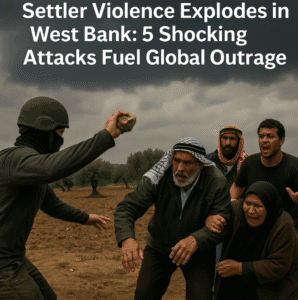Settler Violence Explodes in West Bank: 5 Shocking Attacks Fuel Global Outrage
A wave of attacks by Israeli settlers across the occupied West Bank has intensified tensions, with reports of arson, property destruction, and illegal outpost construction. In Hebron, armed settlers assaulted shepherds in Masafer Yatta, threatening families to abandon their homes, while near Ramallah, agricultural lands in Al-Mughayyir were torched, devastating crops critical to local livelihoods. Jericho saw settlers block access to the Al-‘Awja Spring, a vital water source, before vandalizing Palestinian vehicles.
Near Bethlehem, olive groves were bulldozed to establish an unauthorized outpost—a tactic accelerating land fragmentation. These actions, deemed illegal under international law, compound the displacement crisis in territories already strained by settlement expansion. Legal experts emphasize such acts constitute war crimes under the Fourth Geneva Convention, which prohibits population transfers into occupied areas. Despite global condemnation, enforcement remains absent, leaving Palestinians to face systemic violence, economic ruin, and erasure of ancestral ties to their land. The international community’s inaction emboldens a cycle of impunity, deepening humanitarian and political instability.

Settler Violence Explodes in West Bank: 5 Shocking Attacks Fuel Global Outrage
A surge of violence by Israeli settlers across the occupied West Bank has drawn condemnation as Palestinian communities face attacks, land destruction, and the expansion of illegal outposts. The incidents, reported in multiple regions, underscore a deepening crisis in the territory, where international law continues to be flagrantly violated.
Hebron: Farmers Under Siege
In Masafer Yatta, a cluster of Palestinian villages south of Hebron, armed settlers launched a coordinated assault on shepherds and farmers. Eyewitnesses describe settlers hurling stones at families working their fields, accompanied by threats of further violence if they refused to abandon their homes. Masafer Yatta, already designated as a military “firing zone” by Israeli authorities, has long been a flashpoint for displacement efforts. Local activists report that such intimidation tactics aim to depopulate the area, paving the way for settlement expansion.
Ramallah: Arson and Agricultural Sabotage
East of Al-Mughayyir village, settlers invaded agricultural lands in the Marj ath-Thahab area, setting fire to crops and pastures. The blaze engulfed vast tracts of farmland before residents, lacking adequate firefighting resources, managed to contain it. Farmers in the region, reliant on seasonal harvests, now face devastating economic losses. “This isn’t just about burning land—it’s about erasing our existence,” said one local, who requested anonymity for fear of retaliation.
Jericho: Restricting Access to Water Sources
Near the Al-‘Awja Spring, a vital water resource in the Jordan Valley, settlers blockaded the area, barring Palestinian access. Later, they vandalized vehicles belonging to Palestinians attempting to reach their farms. Such restrictions exacerbate water scarcity in the region, where Israeli authorities already allocate disproportionately limited resources to Palestinian communities.
Bethlehem: A New Outpost Rises
In Beit Ta’mar, east of Bethlehem, settlers bulldozed olive groves in Khallet Al-Qasr to erect an unauthorized outpost—a tactic frequently used to seize Palestinian land. Hasan Breijiyya, a researcher documenting settlement activity, noted, “These outposts are strategically placed to fragment Palestinian territories, undermining any future statehood prospects.” Despite their illegality under Israeli law, many outposts later receive state utilities and protection.
The Legal Lens: Settlements as War Crimes
Under Article 49 of the Fourth Geneva Convention, transferring a civilian population into occupied territory constitutes a war crime. Every Israeli settlement in the West Bank, home to over 700,000 settlers, violates this principle. Yet enforcement remains absent, with settlements expanding relentlessly. Legal experts emphasize that settler violence often occurs with military complicity; reports of soldiers standing by during attacks are commonplace.
The Human Cost
Beyond legalities, the assaults inflict generational trauma. For Palestinians, land is both livelihood and legacy. Olive trees, some centuries old, symbolize ancestral ties to the soil. When settlers torch fields or bulldoze orchards, they erase history and deepen cycles of poverty. Communities like Al-Mughayyir, where 80% of land is threatened by settlements, now grapple with whether to stay resilient or flee under duress.
Global Inaction, Local Resistance
While the UN repeatedly condemns settlement expansion, diplomatic paralysis persists. Meanwhile, Palestinian grassroots movements document violations and replant uprooted trees—a quiet defiance against displacement. International human rights organizations urge third-party states to impose consequences for violations, but geopolitical interests often overshadow justice.
A Call for Accountability –
The latest wave of violence highlights a systemic issue: impunity. Without meaningful intervention, settler aggression and land confiscation will continue to fuel conflict. As Breijiyya asserts, “Silence normalizes these crimes. The world must recognize that overlooking apartheid-like practices only perpetuates suffering.” For Palestinians, the struggle to remain on their land remains a daily act of resistance.
You must be logged in to post a comment.